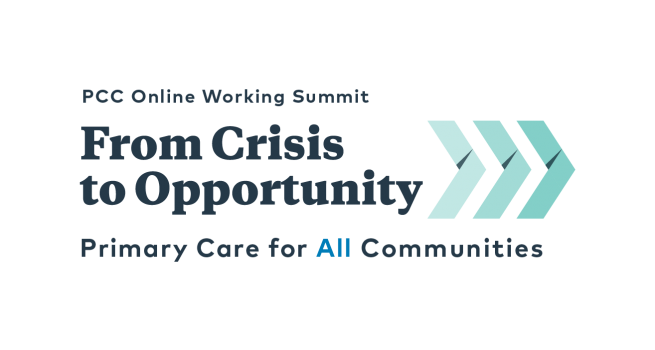You are looking at an archived version of our site. Please visit thepcc.org for a fresh, new experience!
You are here: Array » PCC Hosts Summit of Hi ...
PCC Hosts Summit of High-Level Leaders to Advance Payment and Investment Reforms
WASHINGTON, November 11, 2021—Leaders from the membership of the Primary Care Collaborative (PCC) and other healthcare stakeholder groups gathered Nov. 9 and 10 in an online working summit to consider payment and investment reforms to primary care. Closing gaps in health inequities is a major goal of the changes the PCC is seeking.
Approximately 110 leaders participated in the invitation-only event, titled From Crisis to Opportunity: Primary Care for All Communities. Attendees used the National Academies of Sciences, Engineering, and Medicine’s (NASEM) report, Implementing High-Quality Primary Care: Rebuilding the Foundation of Health Care, released in May, as the basis of their discussions. Attendees heard from a wide range of healthcare experts and leaders, from committee members that produced the NASEM report to community health workers. In small group discussions, participants considered the applicability of the NASEM report’s access and payment recommendations and how primary care can better serve specific populations.
The PCC held the summit to align a broad, diverse group of leaders toward formulating an action plan for implementing the high-quality primary care described in the NASEM report. Emerging from the summit, the PCC plans to develop a coalition of organizations to work toward policy proposals that will reshape the payment and delivery of primary care to address inequities in health care and improve the triple aim of primary care. The coalition will include many of the PCC’s existing member organizations as well as other community organizations with a stake in a strong primary care sector, such as federally qualified health centers, community health worker organizations, rural primary care, primary care start-ups and additional leaders from the behavioral health, oral health and consumer sectors.
In a poll of attendees conducted during the summit, respondents unanimously voiced support for joining a coalition that would be dedicated to increasing investment in primary care and new payment models to support robust teams delivering integrated care and services.
“I am thrilled by the new voices, insights, and perspectives we heard at PCC’s summit, which are at the same time challenging us in new ways,” said Darilyn V. Moyer, MD, FACP, FRCP, FIDSA, Executive Vice President and Chief Executive Officer of the American College of Physicians and chair of the PCC’s Board of Directors. “Going back to the way primary care was delivered before COVID is untenable, and now is the time to come together and speak with one voice to policymakers and decision-makers.”
“The COVID-19 pandemic, the opioid crisis, the country’s falling life expectancy, and the stark health disparities that grow each year – despite the trillions we spend on health care annually – together cry out for collective action,” said Ann Greiner, MCP, PCC’s President and CEO. “And the evidence from the NASEM report that primary care is the only part of our health system that improves outcomes and equity underscore that it is worth fighting for.”
“The country is finally beginning to get serious about addressing longstanding health inequities that COVID-19 made obscenely worse, and primary care is the foundation on which those efforts must be built,” said Sinsi Hernández-Cancio, JD, Vice President for Health Justice, National Partnership for Women and Families and board member of the PCC. “As we reimagine and rebuild primary care, we need to build in equity by design in every aspect of the way it’s delivered and paid for.”
See the speakers who appeared and topics that were addressed at the summit.

Recent News
August 16, 2024
August 12, 2024
July 16, 2024
May webinar highlights: “The Commercial Market: Alternative Payment Models for Primary Care” Nate Murray explains w… https://t.co/KX9Wi2w6oY —
Il y a 2 années 7 mois
@CMSinnovates’ primary care strategy is rooted in a 2021 @theNASEM’s report which called #primarycare “foundational… https://t.co/glbPxvCysg —
Il y a 2 années 7 mois
@CMSinnovates has a new #primarycare strategy, envisioning “ACO-based primary care model tests that may focus on pr… https://t.co/aJGF1z411l —
Il y a 2 années 7 mois
- Page 1
- ››
Secondary menu
Copyright © 2024 Primary Care Collaborative




